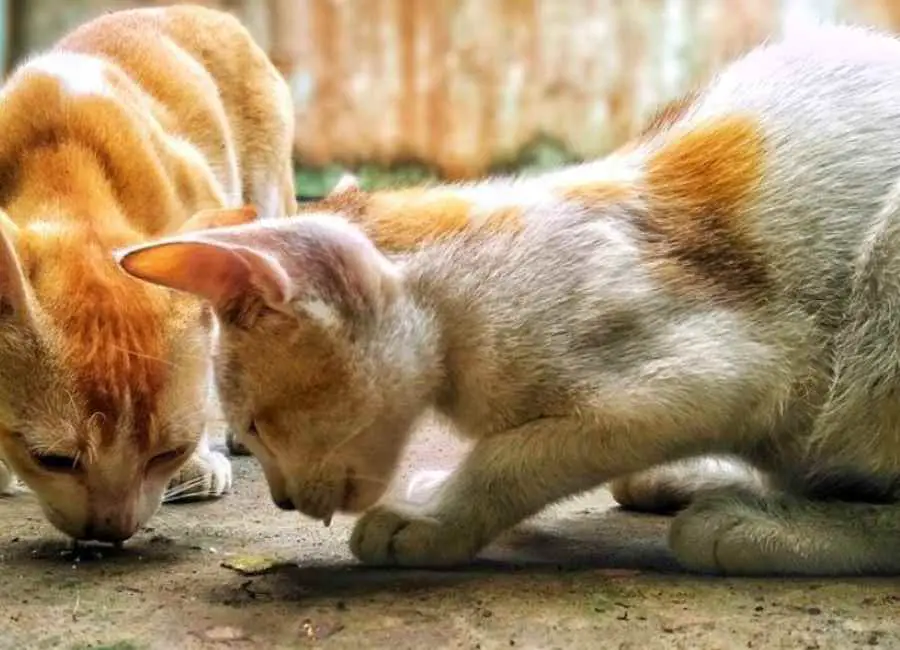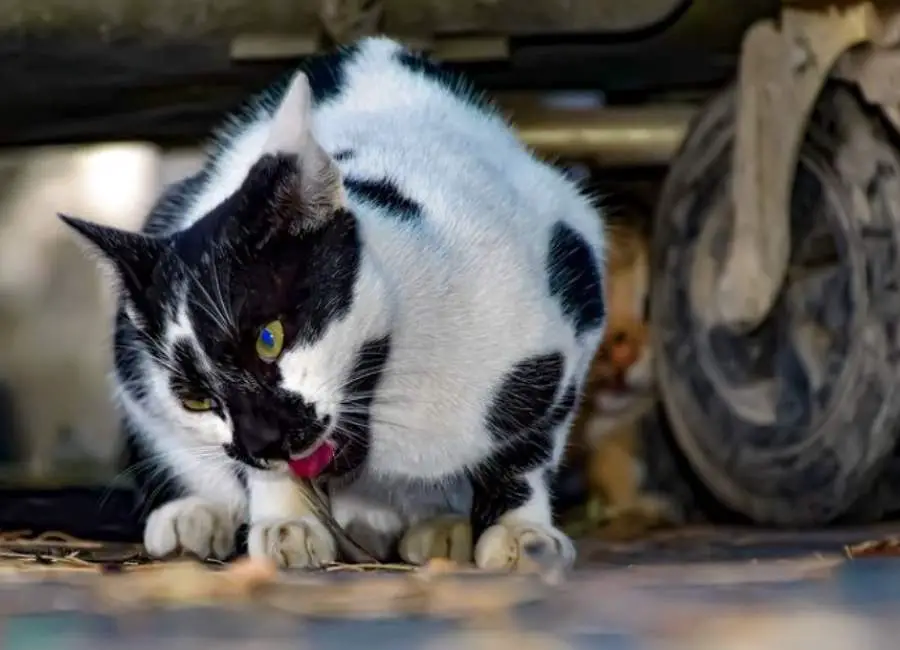12 Potential Reasons Why Cats Throw Up With Tips

This post will address some potential reasons why cats throw up and ways of preventing it, so keep reading!
Throwing up is a common occurrence in cats. But why do cats throw up? And what can you do to help your cat feel better?
We all know that feeling when our cat inexplicably throws up. It’s never a pleasant experience, for either of us. But why do cats throw up?
As it turns out, there are a number of reasons why cats throw up.
Some of them are benign and easily treatable, while others may be more serious and require veterinary attention.
Why Do Cats Throw Up
Cats may throw up for various reasons, including eating too fast, hairballs, diet changes, gastritis (stomach inflammation), parasites, constipation, toxin exposure, and metabolic disorders such as diabetes, kidney disease, and hyperthyroidism.
It’s important to note that while occasional vomiting may be normal for cats, frequent vomiting can be a cause for concern and should be evaluated by a veterinarian.
Let’s break it down further…
Reasons Why Cats Throw Up

Let’s take a look at some most common reasons why cats throw up, and what you can do to help your feline friend:
1. Hairballs
One of the most common reasons for cats to throw up is hairballs.
When cats groom themselves, they ingest a lot of their own fur.
Most of the time, this fur passes through their digestive system without any problem.
But sometimes, the fur can form a hairball in their stomach.
When this happens, the only way for the hairball to get out is for the cat to throw it up.
2. Eating Too Fast
Another common reason for cats to throw up is that they eat too fast.
Cats are known for gulping down their food. But when they eat too fast, they can end up swallowing a lot of air along with their food.
This can cause their stomach to become bloated, and they may end up vomiting to get rid of the air.
3. Eating Grass
You may have noticed that your cat likes to eat grass.
While there’s no definitive answer as to why they do this, it’s believed that they eat grass to help with their digestive system.
Eating grass can help cats throw up hairballs or anything else that’s stuck in their stomach.
4. Motion Sickness
Just like humans, cats can get motion sickness.
If your cat is prone to motion sickness, it’s best to avoid car rides or any type of travel that involves a lot of movement.
Motion sickness can cause a cat to throw up, so it’s best to avoid it if possible.
5. Intestinal Obstruction
One of the more serious reasons for cats to throw up is intestinal obstruction.
This can happen if your cat ingests something it shouldn’t, such as a toy or a piece of string.
Intestinal obstruction can be very dangerous and even life-threatening, so if you think your cat may have one, it’s important to take them to the vet right away.
6. Pancreatitis
Pancreatitis is another serious condition that can cause cats to vomit.
Keep in mind that Pancreatitis is an inflammation of the pancreas, and it can be very painful for cats.
If your cat is vomiting and seems to be in pain, it’s important to take them to the vet right away, as pancreatitis can be life-threatening.
7. Kidney Disease
Kidney disease is another serious condition that can cause cats to vomit.
If your cat has kidney disease, its kidneys are not able to filter toxins from its blood properly.
This can cause a build-up of toxins in their blood, and one of the ways the body gets rid of toxins is by vomiting.
If your cat is vomiting, and you think it may have kidney disease, it’s important to take them to the vet right away.
8. Excessive stress
Stress is another common reason for cats to vomit.
Cats can get stressed out by a variety of things, such as a change in their routine, a move to a new home, or the addition of a new pet to the family.
If your cat is vomiting, and you think it may be stressed, it’s important to take them to the vet right away.
If your cat is vomiting, it’s important to take them to the vet right away to rule out any serious health conditions.
Once the vet has ruled out any serious health conditions, they can help you figure out what’s causing your cat’s vomiting and how to help them feel better.
9. Dietary Changes
Cats are creatures of habit, and they can often get upset stomachs when their diets are changed, even if it’s just a small change.
If you’re switching your cat’s food or treats, do so gradually to give their stomach time to adjust.
And if you’re ever unsure about what to feed your cat or how much, always consult with your veterinarian first.
They can help you create a diet that’s tailored to your cat’s specific needs.
10. Food Allergies
Like humans, cats can also be allergic to certain foods.
If your cat is vomiting and has other symptoms like diarrhea, wheezing, or itching, it’s possible they’re allergic to something they’re eating.
If you suspect a food allergy, the best thing to do is talk to your vet.
They can help you figure out which foods are safe for your cat to eat and which ones to avoid.
11. Parasites
Unfortunately, parasites are a common health hazard for cats.
If your cat is vomiting, has diarrhea, or is losing weight, it could be due to parasites.
There are a variety of parasites that can affect cats, so it’s important to take them to the vet for a diagnosis.
Once the parasite is identified, your vet can prescribe the appropriate treatment.
12. Cancer
Cancer is also a common health problem in older cats, and it can be a cause of vomiting.
If your cat is vomiting and has other symptoms like weight loss, appetite loss, or lethargy, it’s important to have them checked out by a vet.
There are many different types of cancer that can affect cats, so early diagnosis is important.
Your vet will be able to determine if your cat has cancer and recommend the best course of treatment.
Read more: 9 Most Common Ways Indoor Cats Get Worms.
Ways to stop a cat from vomiting
Here are some common ways to stop a cat from vomiting:
- Try to give the cat clear liquids instead of solid food.
- Try to keep the cat warm.
- Give the cat a bland diet.
- Try to keep the cat calm.
- Try to give the cat fluids regularly.
- Place a towel under your cat’s chin to catch the vomit.
- Try to give the cat ginger.
- Call a veterinarian if your cat is seriously vomiting or if the vomiting is ongoing.
- Give the cat plenty of fresh water to drink.
Ways to prevent a cat from vomiting
Here are some ways to prevent your cat from vomiting:
- Keep your cat well-fed and hydrated.
- Deworm your cat regularly
- Provide your cat with fresh, clean water.
- Make sure your cat’s food is fresh and healthy.
- Keep your cat’s environment clean and free from toxins.
- Keep your cat’s stomach empty by preventing them from eating anything that isn’t good for them.
- Give your cat a warm place to rest and relax.
- Never let your cat eat fast or eat green grass.
- Make sure you have the resources necessary to provide immediate help if your cat vomits.
Effects of a cat throwing up excessively
Here are some effects of letting your cat throw up excessively:
- Owners may become anxious or irritable because of the smell of vomit.
- Cats may lose weight because they are not able to digest their food.
- Vomiting may cause a rise in blood pressure and heart rate.
- The cat may aspirate vomit, which can cause a range of health problems including pneumonia.
- Excessive vomiting can also lead to dental problems, including tooth decay and gum disease.
- Cats may be less playful and may stop eating.
- The cat may become dehydrated.
- A cat may develop an infection.
- Cat owners may need to take their cats to the vet for treatment.
FAQs
Why does my cat throw up so often?
There can be several reasons why your cat may be throwing up frequently. It could be due to hairballs, a change in diet, eating too quickly, or even a sign of an underlying health issue. It’s best to consult with a veterinarian to determine the exact cause.
Is it normal for cats to throw up hairballs?
Yes, it is quite common for cats to vomit hairballs. When cats groom themselves, they ingest loose hair, which can accumulate in their stomach and form hairballs. This is a natural process, but if your cat is throwing up hairballs excessively, it’s a good idea to consult with a vet.
Can stress or anxiety cause my cat to vomit?
Yes, stress or anxiety can sometimes lead to vomiting in cats. Just like humans, cats can experience stress from changes in their environment, routine, or even due to other pets. If you suspect stress as the cause, try to identify and alleviate the source of stress or consult with a veterinarian for further guidance.
Can certain foods or treats make my cat throw up?
Yes, certain foods or treats can trigger vomiting in cats, especially if they are sensitive or allergic to specific ingredients. It’s important to introduce any new food gradually and monitor your cat’s reaction. If you notice frequent vomiting after consuming a particular food, it’s best to avoid it and consult with your vet for suitable dietary alternatives.
Should I be concerned if my cat throws up bile or has blood in vomit?
Yes, vomiting bile or blood is a cause for concern and should not be ignored. It could indicate a more serious underlying health issue such as gastrointestinal problems, liver disease, or even ingestion of a foreign object. It’s crucial to seek immediate veterinary attention if you notice these symptoms.
How can I prevent my cat from throwing up?
To reduce the chances of your cat vomiting, you can try a few things. Make sure your cat has a balanced diet, avoid sudden changes in their food, provide plenty of fresh water, and feed them smaller, more frequent meals. Regular grooming to minimize hairballs and keeping their environment stress-free can also help prevent vomiting episodes.
Conclusion
So there you have it, folks! Cats can be prone to throwing up for a variety of reasons, from hairballs to dietary indiscretions. Remember to keep an eye on your feline friend’s habits and consult with a veterinarian if you have any concerns. Together, we can ensure our furry companions stay happy and healthy!
